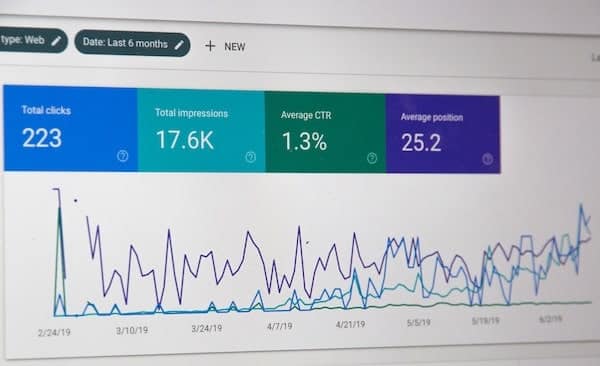You have probably heard the phrase “build it and they will come”. But what if you build it and they don’t? The answer lies in focusing on search engine optimization (SEO) from the very beginning.
This article will outline the 5 first steps for starting an SEO project.
Background
Search engine optimization (SEO) is a method of improving the visibility and ranking of your website within search engines—such as Google, Bing, and Yahoo—to increase traffic. It’s an essential tool for businesses that want to establish an online presence for their brand.
The first step to getting started with search engine optimization is knowing why you should even begin implementing it in the first place.
The answer lies in four core goals: increase organic traffic to your website, increase conversions and sales, increase brand awareness, and stay ahead of the competition.
Before you get started
Before you get started with leveraging search engines like Google for organic SEO, you need to consider the following:
- Understand your business. Know what your business is about and how it’s similar or different from other businesses in your niche. Find out what people are looking for when they search for your type of product or service.
- Put together an SEO strategy. Learn about the various types of search engine optimization techniques, and understand how each is important in the process of ranking high on the first page of a search engine results page (SERP). This can seem a bit overwhelming at first, but once you understand the basics, you can start to see results quickly.
- Create value for customers and visitors. Doing SEO is all about creating value for your visitors and potential customers. If your content is used as a means of just driving more traffic, users will get bored and quickly leave the website. Focus on the reader and the visitor, not gaming search engines.
To help you get started with boosting your company’s visibility on the web, you can use the following five steps.

1 – Analyze where your website stands in terms of SEO
Tracking SEO results is one of the critical pieces of understanding if an SEO strategy is working or not. Many companies realize this about halfway through the process. A tool can help with an analysis of how a website stacks up in terms of search engine optimization.
While the site itself might be ready for visitors, Google and other search engines may not find it as attractive or relevant as they should. To move forward with making adjustments—or even creating new content—you first have to learn about how the back end of your site looks from a usability standpoint and if the website is generating any errors.
Luckily, Google provides some assistance along these lines by allowing you to check your organic traffic performance and identify any potential errors with a tool called Google Search Console.
You can find valuable metrics such as which keywords your website already ranks for, their average position, and even how your website performs in terms of page speed. These metrics are essential because they might guide your initial SEO strategy and point out some low-hanging fruit you can take care of right away.
Google Search Console (GSC) also helps identify issues that might prevent search engines from crawling and ultimately indexing your pages. This is why adding a new website to GSC should be one of the first steps for any SEO project.

2 – Develop a solid website structure
Creating a website structure is another key step for any successful website and SEO project. It helps search engines understand what the website is about, and it makes it easy for users to find what they are looking for.
Gone are the days of driving search traffic to a single landing page website. Creating an intentional and well-planned website structure should be one of the first steps for any successful SEO project. It helps businesses organize and implement key components of a website (like services, case studies, and contact pages). A good structure also helps set a good foundation for adding additional content in the future.
Google (and other search engines) love to rank websites that have pages and content organized like a Christmas tree. Important pages should be at the top which branch off and add more detail to the bottom layers. This helps increase the topical authority of the website and helps explain to search engines what your products and services are about.
3 – Start the keyword research process
When it comes to SEO, no matter what kind of project you’re working on (whether it’s for a business or a personal blog), some general guidelines can help you get started. This is true even if your background isn’t in SEO, but you’re interested in learning about the subject to improve your website.
One of those concepts is keyword research. Keywords are what users type into the search engine, and can range from a single word to entire phrases.
Initially, you want to start by looking for low competition and high search volume keywords. By starting with low competition, high volume keywords and doing thorough research on them, you can begin building content that will be able to rank quickly. To identify these keywords, you can use the tools mentioned in the next section.
Google Keyword Planner
Google Keyword Planner is a free tool from Google but you will have to create a Google Ads account (also free). It’s a helpful tool because it shows search volumes and related keyword ideas. You can generate many search terms using Keyword Planner by typing in your website URL or doing research based on topics.
Focus on longer tail keywords initially (even if they have a lower search volume) because those are typically easier to rank for.
Ahrefs Keyword Generator
Ahrefs’ Keyword Generator is another free tool that you can use when brainstorming new topics to write about on your website. The first few suggestions are usually higher competition but as you make your way down the list you will find keywords that are lower in difficulty.
Contemplate the terms in these lists more thoroughly before starting out with content creation—this may help identify whether specific keywords would make good leads for articles or videos or could be used as supporting information in other pieces.
Keyword Surfer
Keyword Surfer is a free Chrome browser extension that you can use to do keyword research. It will automatically display keyword information when you perform a Google search. This tool will display search volume, cost (for paid ads), and analyze pages that show up on the search engine results page.
Keyword Surfer provides key information for articles that are currently ranking, such as the number of words the article or the page has, as well as how many times the keyword that you entered shows up on that page.
Whatever tool you chose, free or paid, keyword research is one of the key concepts to learn and apply when starting an SEO project.
4 – Create a content marketing strategy by using relevant keywords
Let’s say you run a small business selling gourmet cookies. You’ve built up a loyal following of cookie enthusiasts, but your business is still in the early stages, and you’re looking to get more organic traffic.
You’ve heard that SEO is the best way to attract new customers online, so you want to jump on board with SEO before your competitors do. But how do you get started?
This is where the keyword research you did in the previous step comes in. Use the keywords that you gathered during the previous step to begin writing detailed informational articles or pages.
Maybe you want to educate your audience on the different types of ingredients that they should use, your cooking making process, or perhaps you want to guide them through the various options that you offer in your store.
Remember – creating content is a long-term process, so make sure you stay consistent, stay within your niche, and publish as often as possible. Being intentional and staying relevant with your content creation helps websites build topical authority and help search engines understand what your website is about.
5 – Analyze your website’s technical SEO
When you think of your website, you probably think of it in terms of content, images, and web pages. You may see it as a place to share your thoughts and experiences or as a platform to sell your products or services.
But there’s another important side to your website that can impact its success: technical SEO. Technical SEO is all about your website’s technical structure, good semantic practices, performance, and absence of errors.
Technical SEO makes sure that the search engine algorithms can easily understand what your website is about and how it’s laid out. It also ensures that everything runs smoothly and that visitors don’t encounter any technical issues on your site, such as broken links or images.
When you have good technical SEO, you’ll be able to start to attract organic traffic from search engines and convert that traffic into leads; without it, having the best content in the world won’t make much difference.
You can use the free version of Ahrefs to perform a technical SEO website audit. Simply sign up for a free account, add your website, and the Site Audit tool will identify key technical and performance issues that need to be resolved.
Also, don’t forget to use the Google Search Console data for suggestions on how to improve your technical SEO and resolve any issues identified by Google.

Bonus 6 – Seek promotional opportunities and backlinks
This bonus tip is probably the hardest part of starting and being successful with an SEO project. Once you create an awesome website and have lots of great content developed, you might need to promote it in order to gain backlinks and increase the website’s authority.
Backlinks (other websites hyperlinking to yours) give Google a signal that your website is an authoritative source.
There are a few ways to promote your website but our favorites for beginners are:
- Creating company profiles on high authority websites like Upcity, Google My Business, and Clutch.
- Signing up for HARO as a source and getting featured in popular blogs and websites.
- Sharing your content and blog posts on social media.
Other more effective but harder to implement strategies include outreach and looking for broken backlinks.
Outreach involves identifying similar high authority websites in your niche and asking them for a feature on their website or blog. If they agree, you can create content that they can post which includes a link back to your website. This is one of the most effective strategies but also very time-consuming.
Looking for broken backlinks is another strategy that is similar to outreach. Look for broken backlinks on high authority niche websites (you will most likely need a paid tool for this). Once you identify them, reach out to the website author and ask them to fix the broken link by pointing to your website instead of the broken resource they are currently linking to. This will create a link back to your website and also improve their SEO by fixing a broken hyperlink that generates an SEO error.
And finally, make sure that your blog posts are relevant and beneficial enough that people would happily link back to your website naturally if they find them useful.

5 First Steps For Starting An SEO Project – Conclusion
Starting a new SEO project can seem like an intimidating endeavor. This is especially true for those who have never done it before or those who have tried and failed. However, if you follow these basic guidelines, SEO can be easier than you think.
The key is to understand SEO basics, implement them on your website, track your results, and make adjustments. Although SEO is a vast and ever-changing field, the sound strategies mentioned above have continued to work and yielded results for business owners.
By following the above suggestions and by working through each step of the process, you will be able to begin your first SEO project with a solid foundation and see results quickly.
Check your site and find out what you can change immediately to make your site better with our SEO test.
If you have any questions or want to find out more about our SEO services, contact us today.



